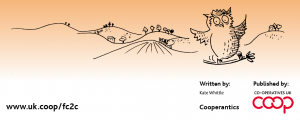It’s hard to believe it was over 10 years ago that I wrote these booklets, together with the excellent cartoonist and illustrator Angela Martin and our patient and knowledgeable editor, Sarah Alldred (then at Co-operatives UK) now at the Co-operative College.
I’d started thinking some time before that helping co-ops set up effective democratic governance structures wasn’t enough – that within ‘flat’ organisational structures, different behaviours are needed. I realised that would-be cooperators will bring their own assumptions about the way work is organised and about the way decisions are taken, based on previous experience – in private enterprise, local government, education, or the charitable or voluntary sectors. Such assumptions if unchecked could lead to conflict or at the very least undermine attempts to establish a ‘co-operative culture’ in the workplace.
I’d also been working on conflict resolution in co-ops, and thought it would be useful to have an accessible and fun resource that people could dip in to for tips and techniques for handling conflict.
So the idea of ‘from Conflict to Co-operation’ was born. There are five booklets:
Booklet 1 encourages us not to be afraid of conflict but to welcome it as a symptom of the wealth of experience, skills and knowledge that exists in our team. It includes an explanation of how conflict arises, an exploration of five different typical responses to conflict and a script for helping us defuse tensions that may arise in the workplace.
Booklet 2 outlines some basic communication concepts and looks at steps we can take to improve communication, including avoiding misunderstandings arising from cultural or gender differences. We discuss the importance of assertive behaviour for good communication and highlight how the enterprise will benefit from maximum participation by members.
Booklet 3 describes how we can make meetings more effective. How to make them reasonably short and enjoyable, with good decisions taken and with everyone coming away with a clear idea of who’s doing what. We also look at a range of different decision-making methods and the implications of their use.
Booklet 4 explores the tensions that can arise as a co-op develops and to identify tools, techniques and approaches which will help as the co-op experiences growth and change. We look at managing change, policies and procedures to address issues such as recruitment, induction and appraisals or personal reviews. We also discuss a participative approach to strategic planning and summarise four strategic planning tools.
Booklet 5 addresses the vital role of the board. We look at the different roles that board members can adopt, the relationship of the board with day to day management and what to do if you are a board member as well as an employee – which hat do you wear when?
I’m delighted to be able to launch the revised from Conflict to Co-operation booklets in #CoopFortnight 2019. The booklets have been updated and additional material added (especially in Booklet 4). They are designed to be read online, so we can add new material and keep them updated. I hope you will find them useful and enjoy reading them.
Kate Whittle

